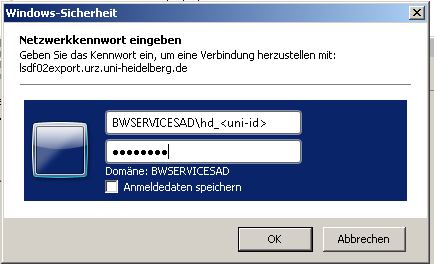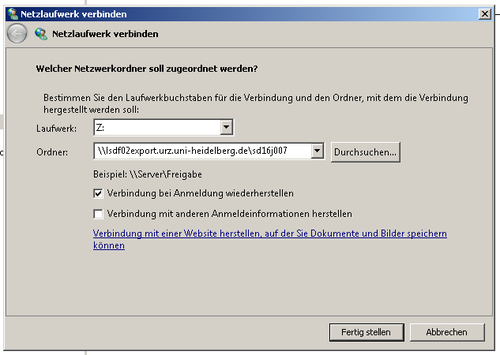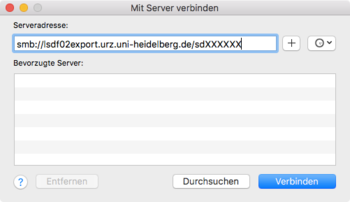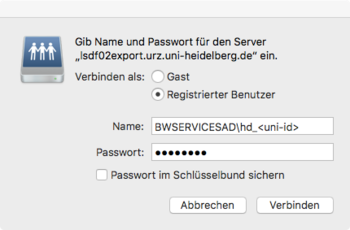Sds-hd CIFS: Difference between revisions
No edit summary |
mNo edit summary |
||
| Line 1: | Line 1: | ||
< |
= <b> Prerequisites </b>= |
||
'''Attention:''' To access data served by SDS@hd via CIFS, You need a '''''Service Password'''''. See details [[Sds-hd_user_access]]. |
'''Attention:''' To access data served by SDS@hd via CIFS, You need a '''''Service Password'''''. See details [[Sds-hd_user_access]]. |
||
| Line 7: | Line 7: | ||
This means you have to use the VPN Service of your HomeOrganization, if you want to access SDS@hd from outside the bwHPC-Clusters (e.g. via [https://www.eduroam.org/where/ edoroam] or from your personal Laptop) |
This means you have to use the VPN Service of your HomeOrganization, if you want to access SDS@hd from outside the bwHPC-Clusters (e.g. via [https://www.eduroam.org/where/ edoroam] or from your personal Laptop) |
||
< |
= <b> Using SMB/CIFS for Windows client </b> = |
||
You can use a CIFS share from a Microsoft operating system. |
You can use a CIFS share from a Microsoft operating system. |
||
== Adopting Universal Naming Convention (UNC) syntax == |
|||
Use Windows Explorer entering the path to the share in UNC syntax: |
Use Windows Explorer entering the path to the share in UNC syntax: |
||
| Line 31: | Line 31: | ||
[[File:Sds-hd-smb-auth.png ]] |
[[File:Sds-hd-smb-auth.png ]] |
||
== Creation of a network (pseudo) drive with Windows Explorer== |
|||
To connect to a network share in Windows Explorer select the control field<br> |
To connect to a network share in Windows Explorer select the control field<br> |
||
| Line 41: | Line 41: | ||
[[File:Sds-hd-smb-netdrive.png|500px|center|border ]] |
[[File:Sds-hd-smb-netdrive.png|500px|center|border ]] |
||
< |
= <b>Using SMB/CIFS for Mac OS client </b> = |
||
<br> |
<br> |
||
== Creation of a network drive with Finder == |
|||
To connect to a network share in Finder select the control field<br> |
To connect to a network share in Finder select the control field<br> |
||
Revision as of 08:23, 21 April 2020
Prerequisites
Attention: To access data served by SDS@hd via CIFS, You need a Service Password. See details Sds-hd_user_access.
Additionally the access to SDS@hd is currently only available inside the belwue-Network.
This means you have to use the VPN Service of your HomeOrganization, if you want to access SDS@hd from outside the bwHPC-Clusters (e.g. via edoroam or from your personal Laptop)
Using SMB/CIFS for Windows client
You can use a CIFS share from a Microsoft operating system.
Adopting Universal Naming Convention (UNC) syntax
Use Windows Explorer entering the path to the share in UNC syntax:
Examples:
\\lsdf02.urz.uni-heidelberg.de or \\lsdf02.urz.uni-heidelberg.de\<sv-acronym>
Following the input of the UNC path, a window will pop up:
Loginname: BWSERVICESAD\hd_xy123
Password: Service Password
Following authentication a new window pops up, showing the content of the share.
You can now manipulate your files as accustomed.

Creation of a network (pseudo) drive with Windows Explorer
To connect to a network share in Windows Explorer select the control field
Select a drive letter to be associated with the network share and enter the network path (e.g. \\lsdf02.urz.uni-heidelberg.de). Select ‘use a different identification‘, as these differ from your credential used locally.
Path: \\lsdf02.urz.uni-heidelberg.de\<sv-acronym>
Username: BWSERVICESAD\hd_xy123
Password: Service Password
Using SMB/CIFS for Mac OS client
Creation of a network drive with Finder
To connect to a network share in Finder select the control field
Select a drive letter to be associated with the network share and enter the network path (e.g. \\lsdf02.urz.uni-heidelberg.de). Select ‘use a different identification‘, as these differ from your credential used locally.
Path: smb://lsdf02.urz.uni-heidelberg.de/<sv-acronym>
Username: BWSERVICESAD\hd_xy123
Password: Service Password


